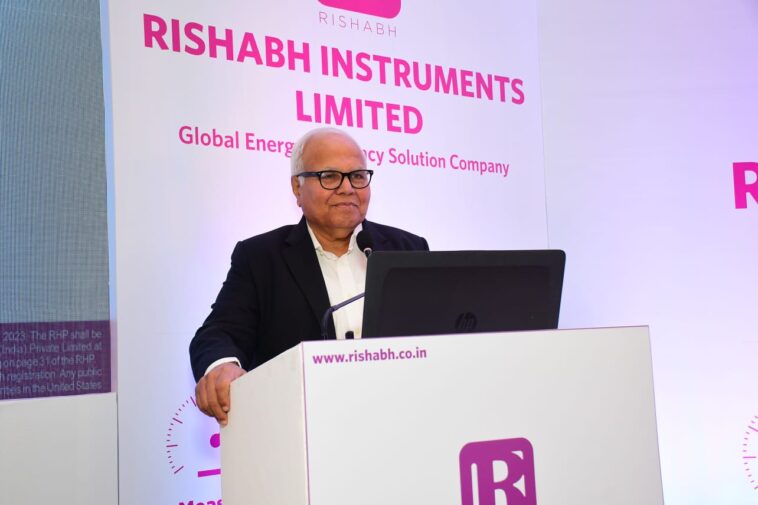Introduction:
Initial Public Offering is a popular term among investors. Recent activity on D-street has been characterized by a flurry of IPOs from emerging sectors and companies driven by modern technology. The IPO juggernaut shows no signs of slowing as we enter the ninth month of 2023.
Rishabh Instruments Limited, a global provider of energy efficiency solutions, is preparing to raise Rs. 491 crore via its IPO, which opens for public subscription on August 30. Consider whether you should invest in the Rishabh Instruments IPO by reading the following information.
About Rishabh Instruments Ltd:
Rishabh Instruments Limited, founded in 1982, is a leading provider of energy efficiency solutions worldwide. Analog panel meters, rotary cam switches, current transformers, shunts, and power factor controllers are only some of the electrical measurement, electrical automation, and process optimization tools it provides. The company offers close-tolerance aluminum high-pressure die-casting options as well.
Rishabh Instruments Ltd. is the top producer of analog panel meters in the world, according to the F&S study. It also ranks highly among the world’s best low-voltage current transformer producers. As of March 2023, the company’s operations span 70 countries, with a particular emphasis on Europe through its wholly-owned subsidiary, Lumel Alucast. In addition, it has production facilities in India, Poland, and China that also have research and development capabilities.
Strengths of Rishabh Instruments Ltd:
- Technology- and innovation-driven organization with sophisticated research and development (R&D) capabilities.
- Global presence in large addressable markets, poised to profit from mega industrialization trends
- Diverse product line supported by solid manufacturing facilities
- A sizable customer base with enduring relationships across the globe.
- Proven record of acquiring profitable enterprises in multiple geographies.
- A business model that facilitates cost-effectiveness and a streamlined consumer supply chain.
- Owns a number of well-known brands in its industry, including ‘Rishabh’, ‘Lumel’, ‘Sifam’, and ‘Tinsley’
- Possesses a highly seasoned management staff
Key risks or weaknesses of Rishabh Instruments Ltd:
- The company’s revenue generation is extremely dependent on its manufacturing facilities.
- Delivering orders late can negatively affect customer relationships.
- The majority of the proceeds from the IPO will be used to expand the Nashik manufacturing facility.
- A sizeable portion of revenue originates from international customers.
- The profit margin can be affected by fluctuations in foreign exchange rates.
- The operation of a business is subject to local government regulations.
Financial Snapshot:
The financials of Rishabh Instruments Ltd. are provided below. According to the company’s Draft Red Herring Prospectus (DRHP), the following information has been compiled:
| Particulars | Fiscal 2023 | Fiscal 2022 | Fiscal 2021 |
| Revenue from Operations | 5,695.40 | 4,702.50 | 3,899.56 |
| EBITDA | 863.17 | 826.32 | 700.21 |
| EBITDA Margin | 15.16% | 17.57% | 17.96% |
| Profit After Tax (PAT) | 496.87 | 496.52 | 359.4 |
| PAT Margin | 8.57% | 10.35% | 8.93% |
| Net cash generated from operations | 275.08 | 132.82 | 529.34 |
| ROCE | 13.77% | 15.20% | 12.60% |
| ROE | 12.39% | 14.58% | 12.01% |
| Debt-Equity Ratio | 0.26 | 0.28 | 0.31 |
| Asset Turnover ratio | 1.12 | 1.17 | 1.27 |
*Amount in Rs. Million
Here are a few takeaways from the above-mentioned table:
- The company’s revenue has grown consistently and robustly by around 20% over the past two fiscal years.
- Profit margins in the 8% to 10% range have remained consistent.
- The Return on Equity (ROE) is between 12 and 15%, which is excellent for a capital-intensive enterprise.
- The asset turnover ratio is between 1.1 and 1.3, which indicates the company’s strength.
CP PLUS 2MP Full HD Smart Wi-Fi CCTV Home Security Camera
Details of the Rishabh Instruments Ltd:
The initial public offering (IPO) for Rishabh Instruments Ltd. would consist of a new issue of 1.7 million equity shares and an offer-for-sale of up to 9.43 million equity shares, for a total of Rs. 491 crores. The IPO begins accepting bids from the public on August 30 and runs until September 1. On September 11th, the shares will be eligible for listing on stock exchanges. In the range of Rs. 418 to Rs. 441, retail investors can place bids for a minimum of 34 shares (1 lot) and multiples thereof.
| IPO Date | 30 Aug 2023 to 1 Sep 2023 |
| Listing Date | 11-Sep-23 |
| Face Value | Rs. 10 per share |
| Price Band | Rs. 418 to Rs. 441 per share |
| Lot Size | 34 shares |
| Total Issue Size | 11,128,858 shares (aggregating up to Rs. 490.78 crores) |
| Fresh Issue | 1,700,680 shares (aggregating up to Rs. 75 crores) |
| Offer for Sale | 9.428,178 shares (aggregating up to Rs. 415.78 crores) |
| Issue Type | Book-built IPO |
Also Read:-Saroja Pharma to launch IPO on Aug 31, aims to raise Rs 9.11 crore
The final verdict
Rishabh Instruments Ltd. is an internationally renowned company with formidable research and development resources. It’s in a field that’s poised for rapid expansion. The return on equity and asset turnover ratio are both very high, therefore the IPO price tag makes sense. Long-term returns can be subscribed to. Take into account the potential downsides of applying for a listing before making your decision.







